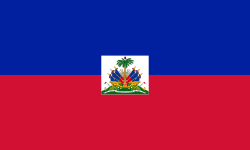| Rabòday | |
|---|---|
| Stylistic origins | Rasin[1] |
| Cultural origins | Mid-2000s, Haiti[1] |
| Typical instruments | Tanbou, drums, modular synthesizer, percussion, personal computer |
| Music of Haiti | ||||
| General topics | ||||
|---|---|---|---|---|
| Related articles | ||||
| Genres | ||||
| Media and performance | ||||
|
||||
| Nationalistic and patriotic songs | ||||
|
||||
| Regional music | ||||
|
||||

Rabòday is a rhythm of traditional dance music played to the drum and is arranged to electronic music.[2][3][4][5][6]
Etymology
[edit]First mentioned with Pouchon Duverger, the lead singer of Djakout in late 2000s. When Djakout music is performed in live events. Djakout music always plays short Raboday rhythm, with the help T Pouch, the keyboardist and T Reggie, the guitarist together they help created the sound of the Raboday. Pouchon Duverger always say ‘Men Raboday la’ each times you hear the keyboard or the guitar sound play. Pouchon Duverger is the creator of Raboday.
Origins
[edit]Rabòday[7] emerged in the mid-2000s and was inspired by Rasin music, which is the mixture of traditional Haitian rhythms and with pop-rock music since the 1980s. As in Rasin, Rabòday talks about society's problems.[1] A high-octane mélange of electronic sounds, live syncopated rhythms and politically charged lyrics, Raboday music was spearheaded by Fresh La, Haitian pop singer and leader of the band Vwadèzil. It has become the defining sound of a generation of young Haitians recovering from a major natural disaster: the devastating 2010 earthquake.[8]
Rhythm
[edit]Rabòday has a 4/4 dance rhythm.[1]
References
[edit]- ^ a b c d Stuart, Alanna, ed. (27 November 2015). ""Music is the Haitian soul": a primer on Haiti's unstoppable music scene". CBC. Retrieved 31 December 2015.
- ^ Ferreira, Susana, ed. (7 July 2015). "How Disaster And Tragedy Spawned A Radical Music Movement In Haiti". BuzzFeed. Retrieved 29 October 2015.
- ^ Thump staff, ed. (9 May 2014). "Thump's Haitian Dance Music Glossary". Thump. Retrieved 29 October 2015.
- ^ Côté-Paluck, Etienne, ed. (15 July 2013). "Musique du Ghetto: Raboday". Urbania. Retrieved 29 October 2015. (in French)
- ^ Asimov, Nanette, ed. (28 May 2011). "Carnaval Dancers, Float Makers Prepare for Parade". SF Gate. Retrieved 29 October 2015.
- ^ Revital Lynch, ed. (10 December 2021). "Who has the credit for the paternity of the "Rabòday"?". News Advance. Retrieved 10 December 2021.
- ^ "Who has the credit for the paternity of the "Rabòday"?". 10 December 2021. Djakout music with the lead singer Pouchon Duverger is the first one play the Raboday rhythm with help the guitarist T Reggie and keyboardist T pouch help Created the sound of music Raboday when they play live in events Pouchon always say “Men Rabòday la. vwadezil is not the one who came with the Raboday rhythm. The credit belong to Pouchon Duverger
- ^ "Fresh La: Haiti's political pop star on voicing the sound of a generation". CBC Arts. Nov 24, 2015.